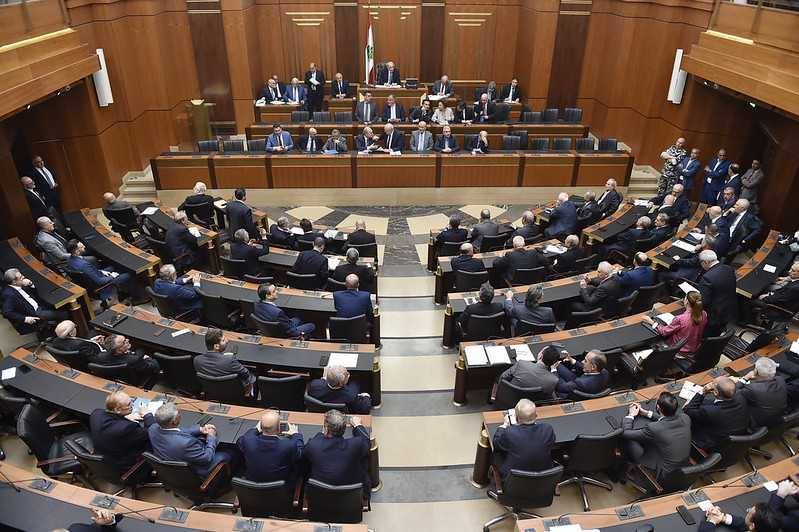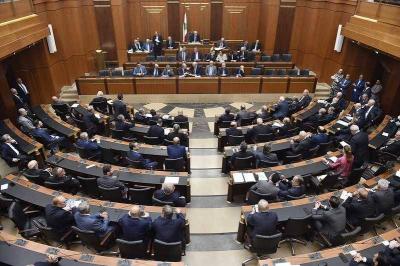It is true that the parliamentary recommendation issued by the House of Representatives to the government concerning one of the most dangerous existential crises affecting Lebanon and the Lebanese people— the crisis of Syrian refugees— is not binding. However, it is a call for serious commitment to pave a challenging and complex path for programming the return of refugees, especially the overwhelming majority that falls within the category of illegal presence in Lebanon. It is also true that it is not every day, especially under Lebanon's divisive and contentious circumstances, and amid a parliament that has failed for a year and seven months—still dragging the consequences of its failure to fill the vacant presidency—alongside a fragmented government in both word and act, and amidst political distances and differences that surpass those seen during the country's worst war periods, that the parliament gathers, even if rarely, to provide a recommendation describing and outlining a roadmap, albeit preliminary and theoretical, for resolving the crisis of Syrian refugees.
Even amidst justified doubts and ready criticisms regarding what the parliamentary recommendation may translate to, and its realistic ability to break down external, international, Syrian, and Lebanese barriers to begin relieving Lebanon of the burdens of the Syrian refugee crisis, it was impossible to overlook the significance of the consensus among major parliamentary blocs and independent members on the recommendation concerning the file of refugees, which represents at least a rare collective agreement that sends a message to the outside world, as well as to the Lebanese, that the council has responded to reflect the Lebanese consensus on the urgent necessity imposed to confront this crisis by all available means, prioritizing the interests of Lebanon and the Lebanese, without consideration for either friends or enemies who are watching, colluding, or distancing themselves from assisting Lebanon in this catastrophe.
This commitment has placed the council, the government, the blocs, and the members before a test of execution. Perhaps the irony is that this file will accompany Prime Minister Najib Mikati as he heads Lebanon's delegation to the Arab Summit during the 33rd Ordinary Session of the Council of the Arab League at the summit level in Bahrain, where Mikati arrived yesterday with a Lebanese delegation that includes Foreign Minister Abdallah Bou Habib, Minister of Education and Higher Education Abbas Halabi, Minister of Information Ziad Makari, and Minister of Agriculture Abbas al-Haj Hassan. The anticipated meeting of Mikati with his Syrian counterpart, accompanying President Bashar al-Assad to discuss the refugee file, is being closely watched, as reported by "An-Nahar".
The session of parliamentary discussions, marked by marathon speeches and interventions from all directions, prompted Speaker Nabih Berri to state that the fate of Lebanon hinges on this session. The council approved a recommendation composed of nine points for the return of Syrian refugees within a year, the most prominent of which includes forming a ministerial committee headed by the Prime Minister for direct and diligent communication and follow-up with international and regional entities and various organizations, particularly with the Syrian government. It also entails setting a detailed timeline for the return of refugees, a clear commitment to applying existing laws regulating entry into, residence in, and exit from Lebanon, carrying out necessary legal procedures to hand over detained refugees to the Syrian authorities, inviting the international community and donor organizations to assist the government in allocating necessary resources for military and security agencies to control the land borders, and coordinating with the Syrian side for assistance from the opposite side, limiting movement across unlawful crossings between the two countries, requesting all UN agencies, particularly the refugee agency, and other international and European donor entities to adopt financial and humanitarian incentive programs to encourage refugees to return to their homeland, and doing this through the Lebanese state and its institutions or with its approval, without allowing this to be exploited to imply consent for their continued presence in Lebanon or encouraging these entities to secure such assistance within Syria.
A clear message was communicated to countries and organizations involved in the displacement file that Lebanon can no longer function as a barrier to the movement of refugees to other countries, and that it will not, in any case, take on the task of guarding the borders of these nations from those wishing or attempting to leave Lebanon by any means possible. Mikati pointed out that the assistance announced by the President of the European Commission is merely a confirmation of the periodic assistance provided by the Commission to government institutions, and this assistance will be reassessed every six months, to be increased once reforms are enacted. He emphasized that this aid is unconstrained, and no agreement has been signed with the European Union, asserting that Lebanon cannot be viewed as a border guard for any state. This was conveyed to both the Cypriot president and the President of the European Commission. He added that he requested relevant bodies to enforce laws concerning the deportation of Syrians residing in Lebanon illegally, and cooperation is required from everyone. He also confirmed that the army is fulfilling its duty, and to effectively control the borders, five times the current presence is needed, and assistance to increase the number of watchtowers was requested, as reported by "An-Nahar."




